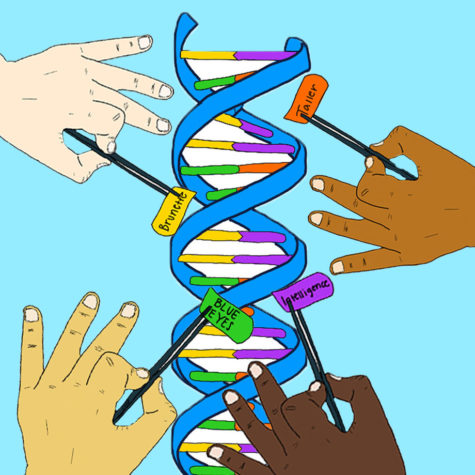Human Gene Editing Questions Ethics In Medicine
April 17, 2019
Since Chinese scientist He Jiankui announced that he was able to genetically edit embryos to create twin girls, ethics committees and scientists alike have questioned where human gene-editing lies along the medical ethics spectrum.
Jiankui began this experiment because of a couple who were trying to have kids but couldn’t. The father was HIV positive and didn’t want to pass it on to his children. Jiankui and his team at Southern University of Science and Technology in Shenzhen, China, performed gene surgery on the embryos made by the parents’ sperm and egg, claiming that they only changed the gene that prevented the HIV infection. However, in an age of vast medical advancements, from vaccines to neurological science, drawing an ethical boundary when coming to terms with human gene editing can become tricky to establish.
In an investigation done by Guangdong authorities, Jiankui reportedly went against multiple government bans by hiding research from supervisors, raising funds and organizing a research team specifically for his experiment.
Health Science teacher Kevin Hunter said he sees Jiankui’s breakthrough as immoral and dangerous and the consequences that follow can be very risky.
“From an ethical standpoint, what he did with human genetic manipulation, without any type of sanction or governing body was highly illegal,” Hunter said. “You’re manipulating human genes in a God-like fashion, and [Jiankui] played God with things which they don’t have any right to do.”
This divine interference in human gene-editing references a new medical phenomenon known as “designer babies,” which are embryos genetically manipulated by parents so that children have a certain hair color, eye color or higher intelligence.
Although this idea of editing embryos to create a “perfect” human is premature, Hunter thinks it can have detrimental effects on our society in the future.

“If they make super people who are evolutionarily a long step beyond other people, like if they’re smarter, faster, bigger, taller, it starts to become something only rich people can have,” Hunter said. “People who think they are better than other people have always been here, but now we have actually manufactured someone that is better than somebody else and making a new breed that’s is closer to “God” like.”
However, Evalyn Sowells, a special education teacher who works with students who have genetic disabilities, thinks this new discovery has its positives, like helping those who have disorders such as down syndrome or cystic fibrosis. This is because it can allow for modifying the embryo to avoid these life-threatening disorders.
“I would say medically it’s ok as long as the people involved are ok with it,” Sowells said. “I think if it helps unborn embryos develop better then that’s fine.”
Sowells, despite seeing the upsides of genetically editing embryos, still takes a personal and religious stance, that many people in society hold.
“I base my ethical values on the Bible,” Sowell said. “I think for humans, this should all be a natural process.”
Clusters of regularly interspaced short palindromic repeats, or CRISPR, the technology used by scientist Jiankui, allows for precise changes to DNA and genetics and is at the forefront of this revolutionary development. The World Health Organization announced in February that they would form a committee to set guidelines for human gene editing, and would look specifically into CRISPR technology.
“There needs to be laws that govern what they can genetically modify and limits at how far they modify certain things,” Hunter said. “It’s dangerous ground, and there needs to be somebody watching what’s going on at an international level.”


